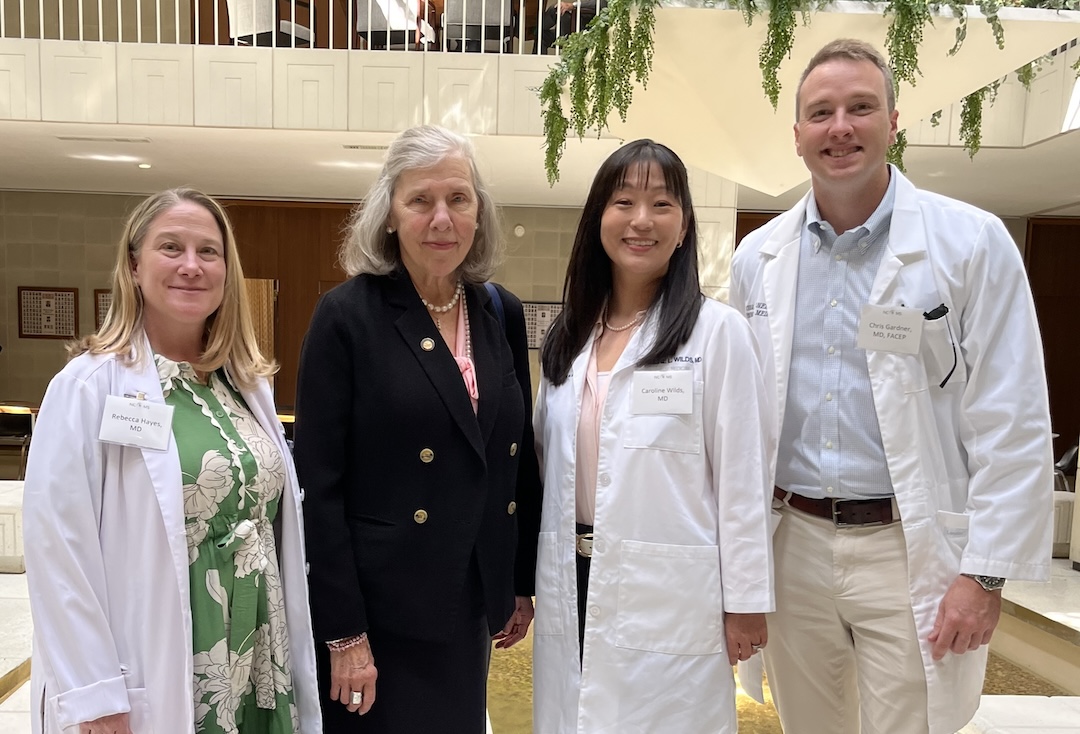
Left to right: Dr. Rebecca Hayes, Representative Becky Carney, Dr. Caroline Lee Wilds, Dr. Chris Gardner
When Dr. Caroline Lee Wilds, Internal medicine specialist at Tryon Medical Partners, received an email about an Advocacy Summit in her inbox; she had no idea that it would launch her into the halls of the North Carolina State Capitol, lobbying legislators and witnessing healthcare policy in action. What started as a weekend learning opportunity has evolved into passionate advocacy work that’s helping shape the future of healthcare for both patients and clinicians.
A chance discovery leads to meaningful involvement
Dr. Wilds’s journey into healthcare advocacy began serendipitously. “The Advocacy Summit just showed up in my email one day – it was about advocacy for physicians,” she recalls. “It seemed like the right time in my career to take advantage of the opportunity, so I went. I’m so glad I did because I am really finding a new passion for advocating for the health of doctors and patients in a new way.”
That initial summit opened doors to deeper involvement. Dr. Wilds soon found herself attending White Coat Day, meeting representatives and senators, and even exchanging cell phone numbers with legislators. What had started as curiosity quickly became active participation in the democratic process.
Fighting for the Care First Act: streamlining prior authorization
The centerpiece of Dr. Wilds’s current advocacy efforts is the Care First Act, legislation aimed at reforming the prior authorization process that has long frustrated healthcare clinicians and delayed patient care.
“Right now, the process is extremely cumbersome and can delay care from patients like imaging scans and medications after they are ordered by a doctor,” Dr. Wilds explains. “The proposed legislation would require insurers to speak with a patient’s doctor before rejecting payment for care, and mandate that peer-to-peer reviews involve a doctor in the same specialty as the treating physician.”
The need for such reform became clear through stories shared by fellow clinicians. Dr. Wilds recounts hearing from an oncologist about a life-saving cancer medication that was denied by an insurance representative who wasn’t a doctor and had no understanding of the medication’s importance. “It was extremely frustrating for him,” she says.
Witnessing democracy in action
Dr. Wilds’s advocacy work reached a memorable peak when she attended White Coat Day just as the Care First Act was being voted on in the North Carolina House. “We got to see the house bill pass on the floor that day,” she shares. “It was extremely exciting to see the bill pass after spending the morning lobbying representatives to vote for it.”
During that day, Dr. Wilds spoke directly with legislators including Representative Becky Carney, Senator Todd Johnson, and Representative Dr. Timothy Reeder, making the case for why this legislation matters for healthcare delivery.
While the House passage was a victory, Dr. Wilds knows the work isn’t finished. “That’s only step one,” she notes. The bill now moves to the Senate, where a similar but less comprehensive version had previously passed. The challenge will be ensuring the stronger House version, with all its provisions, ultimately becomes law.
The broader impact of advocacy
For Dr. Wilds, the benefits of successful prior authorization reform extend far beyond administrative convenience. Research shows that prior authorizations consume so much physician time that one out of every eight doctors in a practice is effectively dedicated to handling them. “It’s amazing how much time this bill would bring back to clinicians, time dedicated to focusing on the patient rather than insurance,” she observes.
The legislation promises to decrease healthcare costs, improve effectiveness for patients, and reduce frustration for all parties involved while still ensuring appropriate medication prescribing.
A commitment to systemic improvement
Dr. Wilds’s advocacy work extends beyond individual legislation. Through her involvement with the North Carolina Medical Society, she’s working on future healthcare policy issues, including debates around noncompete clauses that impact physicians’ practice opportunities, population-specific public health concerns, and AI (artificial intelligence) healthcare implications.
Her motivation is deeply rooted in Tryon’s founding mission. “When we started Tryon, our goal was to make medicine better for the next generation,” Dr. Wilds explains. “I’m trying to do the best that I can to improve healthcare,” she says. “It’s important to work to make a difference.”
Through her advocacy work, Dr. Wilds demonstrates that improving patient care sometimes requires stepping outside the exam room and into the legislative arena, where the policies that shape healthcare delivery are crafted. Her efforts ensure that the physician perspective – and ultimately, the patient perspective – has a voice in those crucial conversations.
